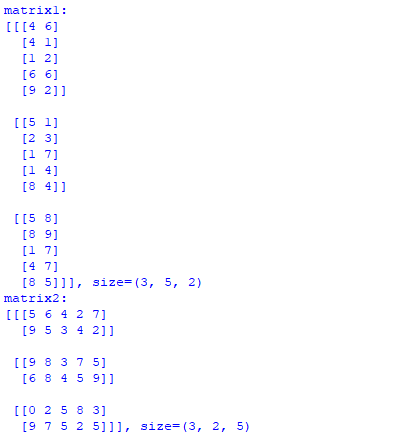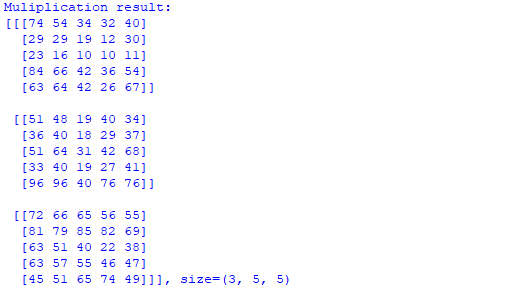Numpy-3d Matrix MultiplicationWhat is a Matrix?The matrix in the programming is also considered a multi-dimensional array. One matrix can be of any dimension, such as a two-dimensional matrix, three-dimensional matrix etc. We can create the two-dimensional matrix by arranging the many one-dimensional arrays (stack of one-dimensional arrays). In the same way, we can create the three-dimensional array by stacking the two-dimensional array or matrix in the third direction. We can do the arithmetic operation on the matrix of the same dimension, like addition, subtraction or multiplication. We cannot do the operations on the matrix of different dimensions. We can multiply the two three-dimensional (3-d) matrices in python using the numpy library. Numpy is the library in a python programming language which is used for the operations of arrays. We can represent any three-dimensional matrix size by (i,j,k), which means there are i number of two-dimensional matrices arranged, and each two-dimensional matrix has the dimension of size jxk. So, as we know to multiply two 2-d matrices, we follow the RXC rule in which the column number of the first matrix should be equal to the other row number of the second matrix. Example:Output:   Explanation: In the above program, we have two 3-d matrices, and we implemented the matrix multiplication using the numpy library. We imported the humpy library in our file to use its functions. We use the random.randInt function, which will create the matrix of a given size with a value in the range we provided. The size of the first matrix is 3x5x2 of a random number which means there are three 2-d matrices of the size 5x2 size. In the same way, we created the second matrix of size 3x2x5 of a random number which means there are three 2-d matrices of size 2 x 5 size. Since the column number of the first 3-d matrix's 2d matrix is the same as the row number of the second 3-d matrix's 2d matrix, we can multiply the 2d matrices easily using the R-C multiplication rule. For the matrix multiplication, we used the inbuilt matmul function of the numpy library. Since there are three 3-d matrices, in the resultant, there also will be three 3-d matrices. The size of a two-dimensional matrix would be 5x5. So finally, the size of the resultant matrix will be 3x5x5. In the resultant matrix, the first 2-d matrix of matrix1 will be multiplied with the first 2-d matrix of matrix2, and in the same way, all the matrices will be multiplied. result[0] = matrix1[0]X matrix2[0] result[1] = matrix1[1]X matrix2[1] result[2] = matrix1[2]X matrix2[2] Note: If the size of the two-dimensional matrices is not the same then there will be an error:Example 2:Output:  Explanation: In the above code, the size of the 2-d matrix in matrix1 is 5 x 2, and in matrix2, it is 3x5, so it will not be multiplied, and we get the above compilation error. Note: if the number of 2-d matrices is not the same, then there also will be an error in the program.Example 3:Output:  Explanation: In the above code, the number of 2-d matrices in matrix1 is three, and in matrix2, it is 6. So, there will be an error due to unequal size. Next Topicos.path.abspath() method in Python |

We provides tutorials and interview questions of all technology like java tutorial, android, java frameworks
G-13, 2nd Floor, Sec-3, Noida, UP, 201301, India










